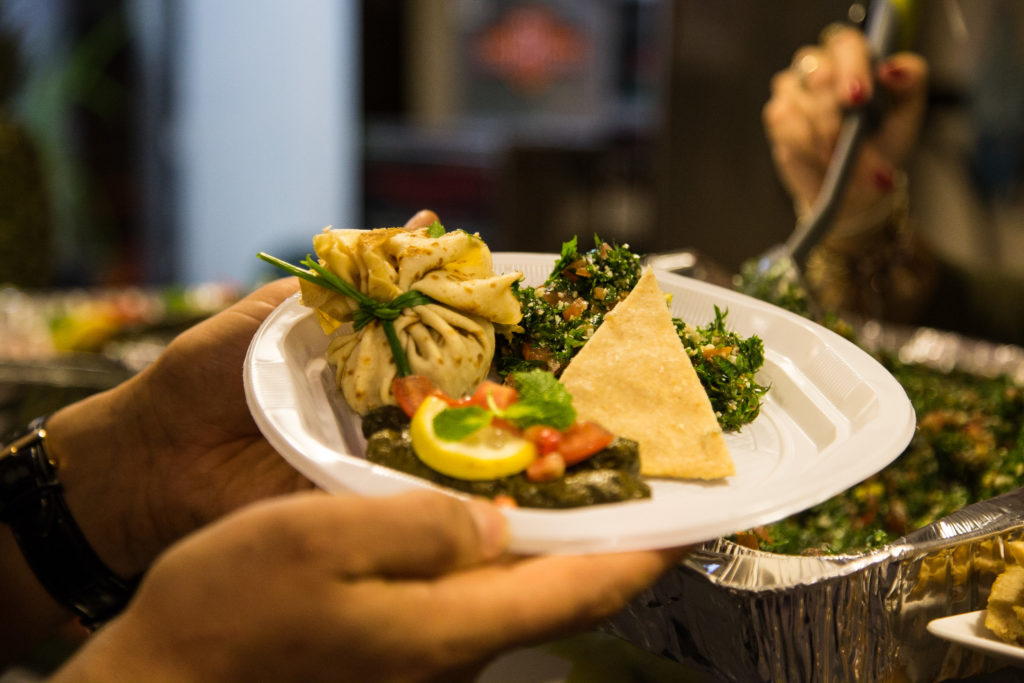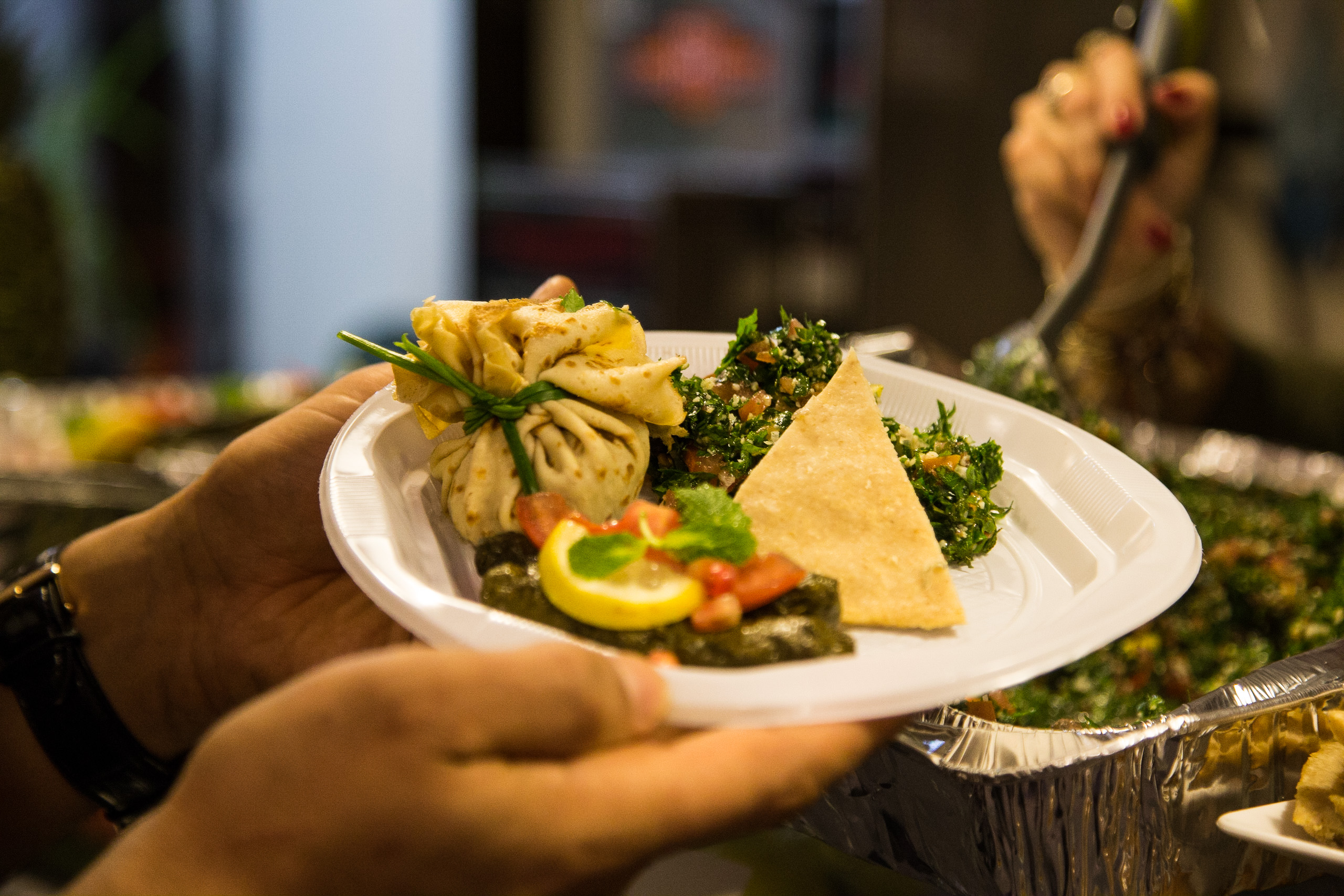Maybe you’ve heard of Chefugee or attended one of the dinners, either ways you’ve liked the idea, and for that we say thank you!
I’m here to tell you that Chefugee is an open project and that you or anyone else can start their own dinners. I come from the programming world and I know that what makes a great open source project is great documentation.
But enough about programming over here, I’m going to document and give you an overview of what you need to do to start a new Chefugee. In each step I’ll tell you what you need to prepare and what we (as Chefugee/Madrid for Refugees team) can provide you.

Steps before the dinner:
-
- Find a Chef: Yes you need a chef to cook for your guests and provide their amazing culture in form of edibles. The only condition here is that the chef must be a refugee.
- What can we do for you: If you don’t have a chef in mind we can connect you with chefs from our database.
-
- Plan the menu: You and your chef should agree on the dishes they’re going to cook.
- Our advice: If it’s one chef, they should think of two starter dishes, two main dishes and one or two desserts. We like our guests to be full and eat until they’re high on calories, so make sure the chef cooks enough for everyone. We also advise you to have vegetarian and vegan options on your menu.
- Find a venue: This could be any space where guests can sit and enjoy food and drink. E.g. restaurants, big homes, co-working space, etc… The place should hold about 30+ people but it can be less if the budget makes sense (more on that below). Also make sure there are enough tables, chairs, plates, glasses, and utensils.
- What can we do for you: We have a few places that we have worked with before and want to work with in the future. We are happy to give you their contact information so you can get in touch with them. Additionally, we have plates and utensils for about 30 people that we can lend to you.
- Find a place for your chef to cook: This can be a kitchen in a restaurant or in someone’s house.
- Our advice: Think this through in terms of how you’re going to transfer the food to your venue. If the chef isn’t cooking in the venue you’ll need a car or a way to get the food to where your guests are.
- Gather volunteers: You’ll need a few volunteers to help you in managing the dinner, like registering people as they come in, serve the food, and clean up after the dinner is done.
- What can we do for you: At MFR we have a long list of volunteers that we will happily connect you with.
- Our advice: In our experience, having a maximum of 10 volunteers worked very well for us in previous dinners.
- Set a date and time: Find out when your venue provider, you, the chef, and the volunteers are free to do this.
- Our advice: We always set Chefugees on a Saturday night 8-9PM, it’s the weekend, people are more likely to have free time to come and enjoy food and company.
- Find a cause to donate to: We usually have a cause that we donate the extra money to, it can be any NGO or association that are helping refugees, inside or outside the country.
- What can we do for you: We can find a cause for you, we have a list of NGOs that would appreciate the help.
- Set the budget: It’s up to you to set the prices for guests, how much the chef is going to spend on food, the chef salary and how much you want to raise for the cause.
- Plan the menu: You and your chef should agree on the dishes they’re going to cook.
- Our example budget: Note that volunteers pay a discounted price, and that we provide 1 glass of wine per guest. These numbers are an example and can be changed to whatever you see fit.
- Funds: (30 guests x 25€ = 750€) (10 volunteers x 10€ = 100€) = total 850€
-
-
- Costs: 250€ chef salary, 200€ food ingredients, 40€ wine, 70€ misc (this is for taxis, plastic plates/cups lunch for volunteers) = total 650€
- Which leaves you 850-650 = 200€ which will go to the NGO you chose earlier
- ***Important*** You probably already know this, but just a reminder that as you are volunteering to host, ALL proceeds from the dinner are to be applied ONLY to food, chef’s salary and the NGO of your choice. Volunteers, both those who support the event and those who host, do not receive any monetary profits.
-
- Email us: Now that you have everything planned you can send us an email at chefugee@madridforrefugees.org with all the information about your Chefugee and what you’ll need from us.
- What can we do for you: We have a partnership with event registration platform ti.to we can setup the event for you and help you with people registering online.
- Publish it and register people: Congrats! If you have come this far it means that you’re having a Chefugee event soon! Publish the event so people can register and pay.
The hard part is over, you planned the dinner, people registered and wants to come to your Chefugee. All that needs to be done now is the actual dinner. Here are the steps during Chefugee day:
- Your chef should start cooking: Maybe the day before the event they can prepare something, it’s up to the chef to decide when they start cooking. Just keep in mind that the food should be ready when your guests arrive.
- Setup the space: Tables, chairs, etc. for your guests. You and a few volunteers can handle this.
- Register people coming in: One or two volunteers can do this, check if people are registered and welcome them into the venue.
- Talk a bit about the food: Your chef can introduce himself and talk a little about the food.
- Serve the food: After all your guests have arrived you can start serving the food
- Our advice: We have a few volunteers serving the food while people are in line next to a serving area. But it’s up to you if you want to deliver the edibles to people’s tables or make it an open buffet.
- Enjoy! You and your volunteers should enjoy the food and the company of your guests.
- Give a little talk: Allow time for yourself as the host, or a Chefugee team member if they attend, to talk about the project and the cause that people are donating to.
- Our advice: We find the best time to do this is after people ate their fill and are waiting for dessert.
- Clean up: After everyone has left, you should clean the space so the host will be happy and offer their place again🙂
You’ve made it! Another Chefugee event done right. Now you can go to sleep knowing you made a lot of people happy and made the world a better place.
About the author
Eyad is a co-organizer of Chefugee. Programmer by day, foodie and a geek by night, and helps Madrid for Refugees in his free time. Open source advocate and trying to bridge that culture into other aspects of life.


